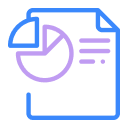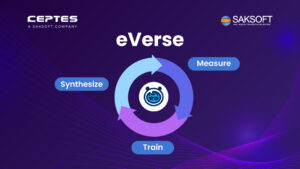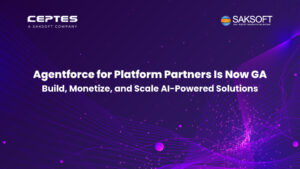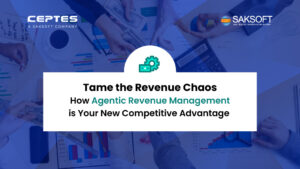Salesforce’s powerful integration of Data Cloud with Marketing Cloud Engagement offers businesses an unparalleled opportunity to craft highly targeted, real-time customer journeys that resonate deeply with individual needs and preferences.
With this Salesforce data integration, companies can unify data, gain actionable insights, and execute personalized campaigns at scale. Let’s explore the potential of Data Cloud and Salesforce Marketing Cloud integration, its real-world applications, and specifically, how it can revolutionize the ecommerce industry with the addition of Commerce Cloud.
Why Hyper-Personalize?
1. Customer Expectations Are Higher Than Ever
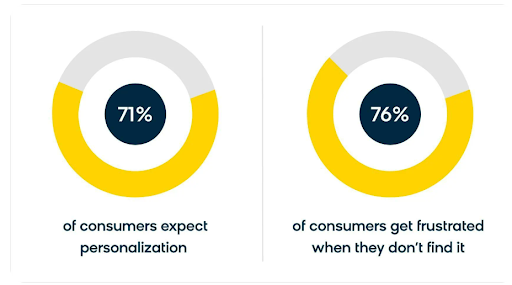
2. Improves Engagement and Conversion Rates
Generic marketing messages often get lost in the noise. When businesses use data to deliver relevant content, offers, and recommendations, customers are more likely to engage. For example, personalized emails generate 6x higher transaction rates than non-personalized ones.
3. Builds Customer Loyalty and Trust
4. Boosts Revenue and ROI
5. Stands Out from the Competition
What is Salesforce Data Cloud + Marketing Cloud?
Salesforce Data Cloud acts as the connective tissue for customer data across various touchpoints. By combining it with Marketing Cloud Engagement, businesses can seamlessly combine powerful data management capabilities with personalized marketing execution. Salesforce Data Cloud unifies customer data from multiple sources in real time, creating a single source of truth with comprehensive customer profiles.
When integrated with Marketing Cloud Engagament, this data fuels highly personalized and dynamic marketing campaigns across email, social media, mobile, and other channels. The Salesforce Marketing Cloud integration with Data Cloud allows marketers to leverage real-time insights and AI-driven predictions to tailor customer experiences, trigger automated actions, and deliver the right message at the right moment. This synergy enhances customer engagement, improves marketing efficiency, and drives measurable business outcomes.
Data Cloud and Salesforce Marketing Cloud integration is a game-changer for businesses aiming to deliver cutting-edge marketing strategies.
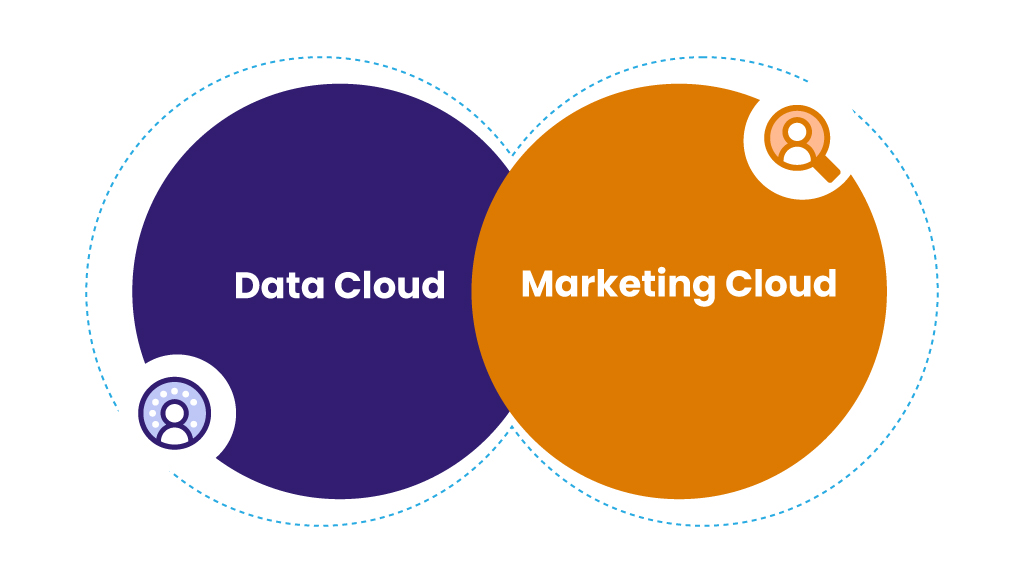
Steps to Accomplish the Integration
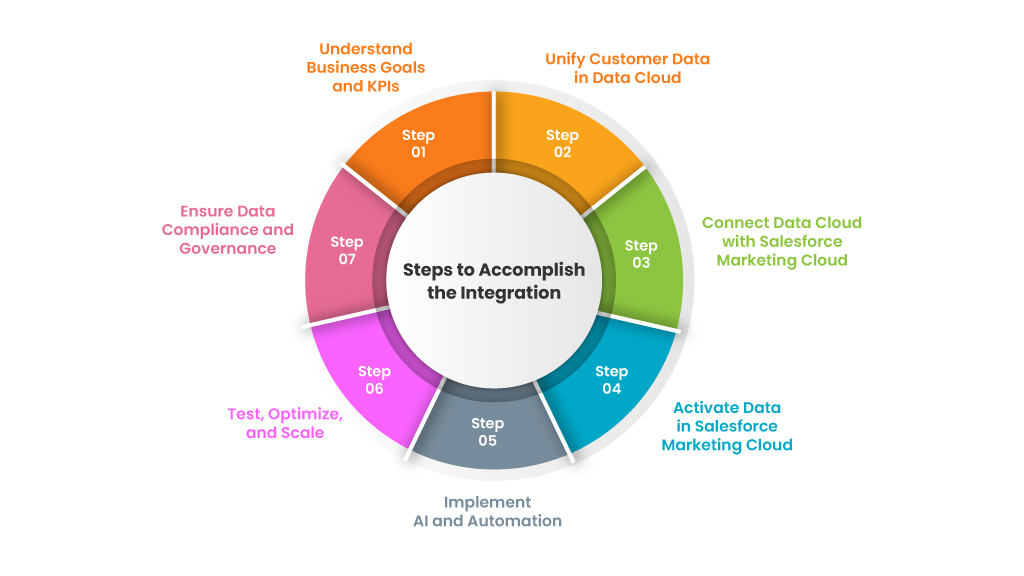
1. Understand Business Goals and KPIs
Identify key objectives, such as reducing customer churn, improving lead conversion rates, or creating seamless multi-channel campaigns. Define metrics to measure success, such as engagement rates, sales growth, or customer satisfaction scores.
2. Unify Customer Data in Data Cloud
Centralize data from various sources, such as CRM, eCommerce platforms, social media, and offline systems, into Salesforce Data Cloud. Use the Data Cloud to create unified customer profiles and segment audiences based on real-time insights.
3. Connect Data Cloud with Salesforce Marketing Cloud
Utilize native Salesforce data integrations like Marketing Cloud Connect to synchronize customer data and segments with Salesforce Marketing Cloud. Share real-time customer insights, including preferences, behavior, and purchase history, between the platforms.
4. Activate Data in Salesforce Marketing Cloud
Use data from the unified profiles to create targeted and personalized campaigns across email, mobile, social media, and other channels. Leverage Salesforce Marketing Cloud’s tools, such as Journey Builder, to design dynamic, multi-step customer journeys.
5. Implement AI and Automation
Integrate Einstein AI to analyze customer behavior and predict future actions, enabling smarter segmentation and personalization. Automate real-time triggers in Salesforce Marketing Cloud based on updates from Data Cloud, such as abandoned cart reminders or loyalty rewards offers.
6. Test, Optimize, and Scale
Continuously monitor campaign performance against the defined KPIs. Use insights to refine strategies, optimize content, and scale successful campaigns across larger audiences.
7. Ensure Data Compliance and Governance
Maintain customer trust by managing data privacy and adhering to regulations like GDPR and CCPA using Data Cloud’s built-in governance tools.
By aligning the Salesforce Marketing Cloud integration process with business goals, organizations can create a data-driven foundation for meaningful customer interactions and achieve measurable marketing success.
Benefits of this Integration For Marketers
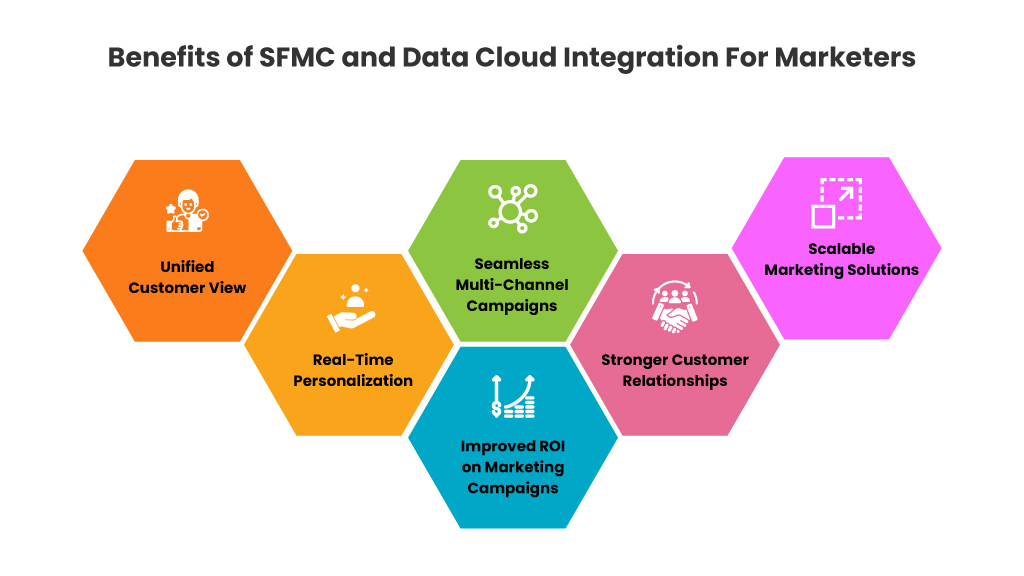
The integration of Salesforce Data Cloud and Marketing Cloud Engagement offers numerous benefits that empower businesses to deliver personalized, data-driven marketing and achieve better customer engagement. Here are the top 6 ones:
1. Unified Customer View
The Salesforce Marketing Cloud integration with Data Cloud combines data from multiple sources into a single, unified customer profile. And this enables marketers to better understand customer preferences, behaviors, and needs.
2. Real-Time Personalization
Ofcourse, as the topic itself suggests, this Salesforce data integration is a huge aid in advanced Salesforce personalization. It delivers real-time insights from Data Cloud directly to Salesforce Marketing Cloud which allows businesses to create dynamic, personalized marketing campaigns tailored to individual customer moments.
3. Improved ROI on Marketing Campaigns
Campaign relevance is Increased through precise targeting and personalized content which in-turn, boost customer engagement and conversion rates, maximizing return on marketing investments.
4. Seamless Multi-Channel Campaigns
This integration enables consistent and connected experiences across email, social media, mobile, and other channels. It also helps brands maintain a cohesive message, no matter where or how customers interact.
5. Stronger Customer Relationships
With hyper personalization, businesses can build trust and loyalty through, meaningful interactions. Data Cloud and Salesforce Marketing Cloud integration also enhances the overall customer experience by understanding and addressing individual preferences.
6. Scalable Marketing Solutions
With data cloud and Salesforce marketing cloud coming together, growth is facilitated by scaling personalized campaigns to larger audiences without losing relevance. Ad it also dapts to evolving business needs and market conditions.
By integrating Salesforce Data Cloud with Marketing Cloud Engagement, businesses can unlock the full potential of their data, transforming it into actionable insights and impactful marketing strategies.
Now, its time to dive deep into some real world use cases to understand this better:
| Use Case | Scenario | Integration Details | Example |
|---|---|---|---|
| Retail | Enhancing In-Store and Online Experiences |
– Data Cloud captures in-store purchases, online browsing history, loyalty program data, and social interactions. – Marketing Cloud sends highly relevant messages, like reminders about products browsed online when near a store. |
Real-Time Discounts: When a customer enters a store, a push notification delivers a personalized discount, e.g., “Welcome back, David! Get 30% off the shoes you were checking online.” |
| Travel and Hospitality | Personalizing the Travel Journey |
– Data Cloud consolidates flight preferences, past trips, and reward points. – Marketing Cloud sends timely notifications like upgrade offers, dining recommendations, or reminders to redeem miles. |
Dynamic Itinerary Updates: If a flight gets delayed, Data Cloud updates the profile instantly, and Marketing Cloud sends an SMS offering lounge access or airport cafe discounts. |
| Financial Services | Offering Tailored Financial Advice |
– Data Cloud integrates transaction histories, investment profiles, and credit scores. – Marketing Cloud delivers targeted campaigns, such as retirement planning guides for specific customers. |
Smart Budgeting Tips: For customers recently starting a new job, the bank could send personalized budgeting strategies or savings account offers. |
Ecommerce Use Case: Unlocking the Power of Commerce Cloud + Marketing Cloud + Data Cloud
Now, let’s explore an end-to-end Salesforce personalization use case by a business:
Scenario: Revolutionizing Ecommerce Salesforce Marketing Cloud Personalization
For ecommerce companies, the integration of Commerce Cloud with Marketing Cloud and Data Cloud opens up a world of possibilities. Here’s how it works:
- Data Cloud: Unifies customer data from multiple sources—like browsing behavior, purchase history, abandoned carts, and loyalty programs.
- Commerce Cloud: Acts as the transactional powerhouse, enabling seamless online shopping experiences.
- Marketing Cloud: Drives personalized communication, ensuring customers receive messages tailored to their preferences and behaviors.
Emily’s End-to-End Salesforce Personalization Story
Imagine an ecommerce company selling fashion apparel, and here is Emily’s Marketing Cloud Personalization story:
Step 1: Browsing History
A customer, Emily, browses sneakers but doesn’t make a purchase. Data Cloud captures her browsing behavior.
Step 2: Abandoned Cart
Emily adds sneakers to her cart but leaves without checking out. Commerce Cloud logs this as an abandoned cart.
Step 3: Personalized Follow-Up
Marketing Cloud sends Emily a personalized email: “Still thinking about those sneakers? Here’s 15% off to make them yours!”
Step 4: Real-Time Recommendations
When Emily revisits the site, Data Cloud enables real-time product recommendations: “Pair your new sneakers with these trendy leggings!”
Step 5: Post-Purchase Engagement
After Emily completes her purchase, Marketing Cloud triggers a thank-you email with tips on how to style her new sneakers, along with a loyalty points update.
Wrap-up
Salesforce Data Cloud, when combined with Marketing Cloud Engagement, empowers businesses across industries to create personalized, data-driven customer experiences that drive engagement, loyalty, and revenue. For ecommerce companies, the addition of Commerce Cloud amplifies these capabilities, enabling seamless, end-to-end personalization that not only meets customer expectations but exceeds them.
Are you ready to take your personalization strategies to the next level? Salesforce’s ecosystem has all the tools you need to transform customer engagement and drive measurable results with Salesforce personalization.
We are also hosting a very insightful webinar on a similar topic—Go For Next Level Marketing Automation with Salesforce Data Cloud + Marketing Cloud to take this Salesforce personalization story to the next level with industry leaders and live demos. Do join us! Here’s the link to register.
FAQ:
1. What is the key benefit of integrating Salesforce Data Cloud with Marketing Cloud?
2. How does the integration improve personalization?
3. How does this integration support data privacy compliance?
4. Which industries benefit the most from this integration?

Nilamani Das
Nilamani is a thought leader who champions the integration of AI, Data, CRM and Trust to craft impactful marketing strategies. He carries 25+ years of expertise in the technology industry with expertise in Go-to-Market Strategy, Marketing, Digital Transformation, Vision Development and Business Innovation.










